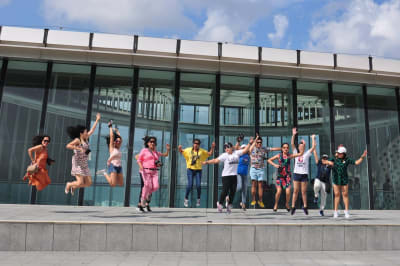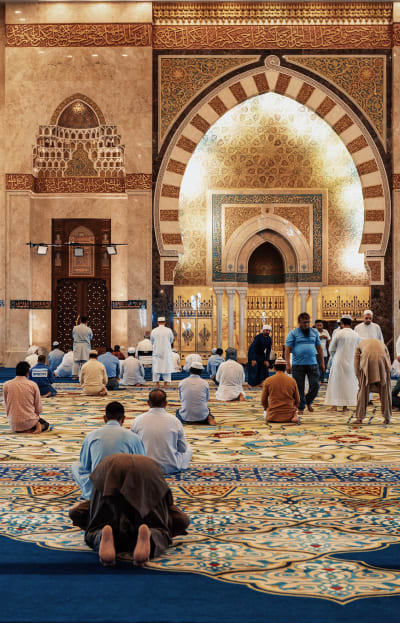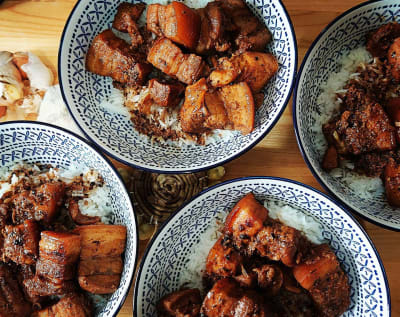Musicians from across the world have found a vital voice and a lifetime of opportunity in Hong Kong
WHEN MAKHA DIOP arrived in Hong Kong, 20 years ago, he panicked. “I didn’t know what to expect – I’d never even seen a picture of the city,” remembers the Senegalese musician of his firstever trip abroad. “When I arrived at the Central Pier I was like: I can’t stay here, I’ve got to go back.”
Born and raised on tiny Goree island (population: 1,800), the then-21-year-old percussionist had been invited by a former pupil to play two weeks of concerts in Hong Kong and China. “When he saw the shock on my face, the guy who invited me said, ‘There is an island, similar to where you’re from’,” he continues. “As soon as I got to Lamma I felt at home. It gives me a sense of balance – it’s closer to Africa in feel.”
Twenty years later, Makha still calls the outlying island home, after building a reputation, career and life on sharing his instrument, the djembe, with the city. Last year he celebrated the milestone of opening his own studio in Wan Chai, Sankofa, named after a metaphorical symbol of Ghana’s Akan people.
“I came for two weeks, but the demand – people liked it, and more and more opportunities opened up, and one thing led to another,” he says. “There was nothing like this in Hong Kong so it was an opportunity to introduce African music to the community.”
After the original Djembe Massive band split up, Makha founded his own organisation, African Drumming and Dance Connection Company (ADADC), in 2005, and started collaborating more deeply with local Chinese musicians.
“From that moment on I was focused on playing with local people and taking this music into the culture,” he says. “People had no idea what we were doing. I had to establish it and educate people. I had to explain to the government the benefit it brought to the community.”
Makha has been called on to perform for visiting dignitaries Bill Clinton, Nelson Mandela and Pope John Paul II, and appeared at the city’s flagship Clockenflap festival no less than five times. But his deepest engagement comes in the classes and workshops he leads, that range from toddler-parent bonding sessions to corporate team-building exercises.
“Was I a pioneer?” he adds. “In a way, yes – but I can never take this credit.”
The tale of a life completely changing course after a chance encounter is not uncommon among Hong Kong’s professional musicians. After half-year stints in Singapore, Vietnam and Japan, Spike Cazcarro took a temporary gig at Amazonia in 2005, as a member of Ice Box – today they remain the Wan Chai nightclub’s house band, and have never gigged at any other venue in the city or beyond since (despite offers even from the US).
“We came back from playing in Japan and our boss said, ‘I’m opening a new bar in Hong Kong and I want you there in six days’,” says the Filipino singer. Today, three of the original members are still in the band, wheeling out many of the same beloved rock classics, six nights a week. “After 16 years playing four sets a night, we’ve played ‘Satisfaction’ more than The Rolling Stones have!” laughs Spike. But the self-dubbed “rocking grandpa” plans to retire from the stage for good in two years, to return home to his grandchildren, and life on the farm his rock n’ roll antics have allowed him to build.
After 16 years playing four sets a night, we’ve played ‘Satisfaction’ more than The Rolling Stones have! – Spike Cazcarro, Ice Box (Amazonia house band)
“The big difference between us and other bands is we stay in one place, we have a home,” he adds. “We really love what we’re doing, and the music we’re playing is the music we grew up on – most bands in Hong Kong are told what to play, but we play what we want. We don’t just do it for the money.”
The money, of course, dried up when the pandemic hit, and for the first time in 15 years, Spike was forced to take a second job working cargo – a role he’s hung onto amid the lingering uncertainty. After finishing onstage nightly at 3.15am, and arriving home in Tung Chung after 5am, he now works noon until 7pm, four days a week, at Hong Kong Airport – before heading back to Wan Chai for the band’s 9pm opening set. “I really want to give that job up,” admits the 53-year-old. “But I have proved to myself I can do another thing besides being in a band. I’ve been singing all my life.”
Spike’s story is familiar to many, with Filipino pro musicians dominating much of Hong Kong Island’s colourful nightlife scene. Longtime favourites include Iris Pascual, who leads regular attraction Rubicube, Cheung Chau troubadour Maryjane and even OPM idol Paul Sapiera, the former frontman of Rockstar who recently left Hong Kong after more than a decade in the city.
Multi-instrumentalist Jimi S. Galvea Jr. has been a mainstay of this scene for more than four decades. After spending the 80s gigging popular Causeway Bay and Tsim Tsa Tsui clubs as part of Boys in the Band, he led a pop covers trio at numerous hotels throughout the 90s, and later formed the airport resident Three Brothers Jazz Trio – all while moonlighting in classic rock cover bands The Speed King, Helter Skelter and The Gozer.
Aged 67, he continues to rock out with MNG, aka Mr. Nice Guy. “Comparing the music scene here and the Philippines? It’s totally different,” he says. “There, it’s harder to please the crowd – it takes some time to show your talents before they appreciate [you].”
Away from the neon lights and hotel lounges, working migrant musicians have long found a cathartic platform and welcoming community at The Wanch – the beloved Wan Chai live music institution established in 1987 which, after sadly closing at the height of the pandemic in August 2020, is set to shortly reopen in a new home.
“The city’s music scene is a place where people of all backgrounds and ethnicities come together,” says Oliver, the founder of live music photography platform Hong Kong Rocks, a passion project which has seen the 49-year-old German shoot more than 300 bands over the past 12 years.
“Where in other countries bands would be much more segregated entities that see each other as competitors, Hong Kong’s musicians are always ready to help each other out, no matter who they are or where they’re from. Everyone is happy to support and make music together instead of trying to build walls.”
Pinoy-led bands including alternative trio Bebe’s Wish, ska-punk revivalists Bulletproof and young upstarts Radeyo have all made a mark on the city’s underground scene, while the homegrown Nepali community has long rocked loud and proud, with notable outfits including Loud Shaft, Dibya Drisdy and Radio Resurgence.
"Music is about the passion. If you are talented, if you have something special, no one can stop you" – Dipen Gurung, Intellectual Morons
“The scene in Hong Kong … you can’t really make a living with music, you need to have side income or business – you need a job,” says Dipen Gurung, the former frontman of successful nu-metal and rapcore outfit Intellectual Morons.
Following his own advice, in 2016 the Hong Kong-raised Nepali founded Funky Monkeys in Jordan, a booming bar which now boasts outlets in Tsim Sha Tsui and Tung Chung. But since his band split in 2018, he has shifted into hip-hop and R&B, refusing to give up his dreams.
“A lot of great musicians don’t have time to practise or perform because they are focused on their jobs – I know a lot of musicians like this and I feel really bad for them, I don’t want to be them,” adds the 39-year-old. “Music is about the passion. If you are talented, if you have something special, no one can stop you – you might succeed someday. Just keep going and never give up. Put whatever is in your mind and whatever you feel into song. Into words – your words.”














